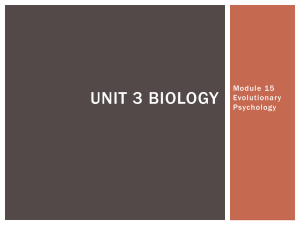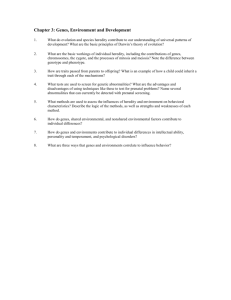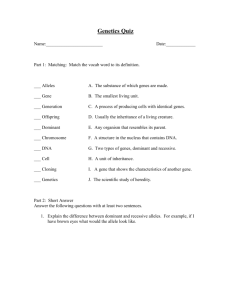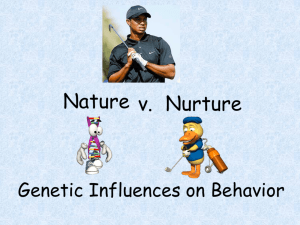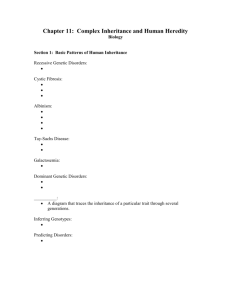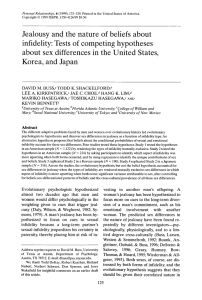The Biological Perspective
advertisement
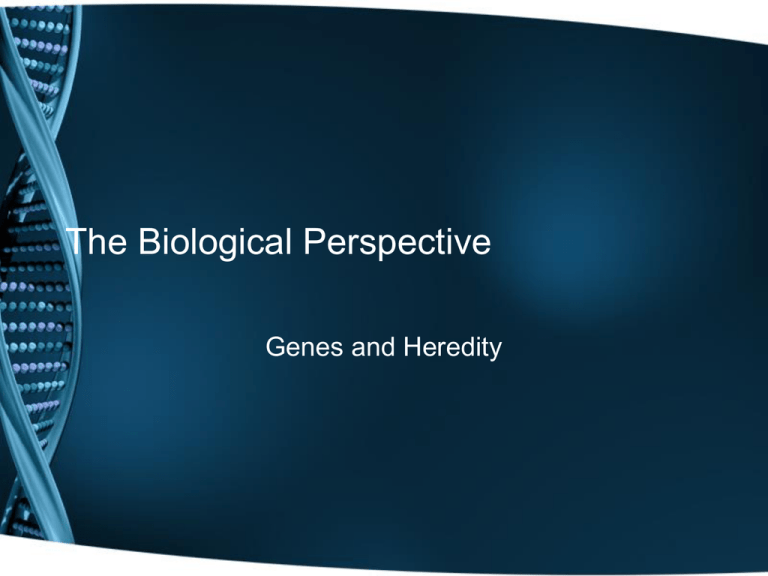
The Biological Perspective Genes and Heredity Physiological Psychology • Physiology is the scientific study of living organisms and is concerned with functions and processes that sustain life. In contrast, anatomy is the study of the structures of living organisms. Psychologists are interested in the physiology of animals especially human beings. • This is because of the importance of our nervous system particularly the brain, and because of its role in how we behave, think and sense the world around us. Physiological psychologists are also interested in the interaction of the physical body and the mind. The body can affect the mind, as shown by the effects of alcohol. In turn the mind can affect the body, for example, extreme stress may cause tiredness and lethargy. What do Bio psychologists think? • Bio psychologists generally regard the brain and the mind to be the same thing. • Others regard mental life as not physical, and hence different to brain functions. This is known as the mind body problem and was first raised by the French philosopher Rene Descartes (1596-1650) http://www.youtube.com/watc h?v=7GzBeS8KDcY The Genetic basis of behaviour • Genetics is the study of the genetic make-up of organisms and how this influences physical and behavioural characteristics. • Heredity is the traits, tendencies and characteristics inherited from a person’s parents and their ancestors (Carlson and Buskist 1997). • We can see from these definitions that genetics and heredity are similar. Heredity concentrates on what we inherit from our parents. Genetics, by contrast, is less concerned with inheritance and more interested in hoe genes determine the physical and psychological characteristics of a person. Darwin’s theory of evolution • This states that human beings have evolved over millions of years. Evolution has brought us from very simple creatures that lived in the water. What we have evolved over this time is genes. Genes are units of inheritance that are passed on to future generations through sexual reproduction. • Genes are found in the nucleus of each cell in the body and exist in pairs located on pairs of chromosomes. In humans there are 46 chromosomes arranged into 23 pairs. Genes are the unit of inheritance that determines the colour of our eyes, for example. What do Bio-psychologists think? • Biological psychologists claim that psychological characteristics such as intelligence and personality are determined by our genetic inheritance. • It is also claimed that some psychological disorders, such as schizophrenia and bipolar depression, are a result of our genes. Genes, then, not only determine human physical characteristics, but might also determine numerous psychological ones as well. A2 Biopsychology • The biological perspective is, broadly speaking, concerned with how our genetic inheritance, evolution of the human species and the nervous system (both central and peripheral) affect how we think, feel and behave. • More particularly, the biological perspective, looks at how well a person adapts and adjusts in life. Maladaptiveness may be seen in terms of a person suffering from psychological disorders, such as schizophrenia and depression or being aggressive towards other people. Hence, the biological perspective seeks to discover how the genes we inherit from our parents may have a role to play in these and other types of maladaptive behaviours. • The biological perspective is also concerned with understanding how our central and peripheral nervous systems, particularly the brain, affect how we think, feel and behave. Questions arise within the bio perspective such as how the brain and the mind interact and are related (mind-body debate). Also of interest is how the brain, a physical organ, can produce the psychological experience of awareness of things around us and consciousness. These are matters that physiological psychologists find difficult to answer. Other issues Bio-psychology raises • The Bio-perspective also raises the issue of the relative contribution of nature and nurture to mental abilities such as intelligence and actual behaviours (such as schizophrenia and aggression). Commonly called the nature/nurture debate or the debate about the relative contribution of heredity and environment. Recent developments • A recent development in biological psychology is called evolutionary psychology which is defined as follows: ‘Evolutionary psychology is the study of the evolutionary origin of human behaviour patterns… that may influence everything from sexual attraction, infidelity and jealousy to divorce.’ (Coon 2002) • One area that has been extensively researched within a biological/evolutionary psychology perspective is that of human mating or sexual preferences. Buss (1994) studied attitudes and behaviours of men and women across 37 different cultures towards sexual behaviour. He found that men compared to women are more interested in casual sex, prefer a younger partner and get more jealous over sexual infidelity on the part of the woman. By contrast, women prefer older partners, are less upset by sexual infidelity but more upset by a man becoming emotionally involved with another woman. • Buss (1994) attributes these differences to mating preferences that have evolved in response to the reproductive demands placed on men with providing for the family. Although this traditional pattern has dramatically changed in more westernised societies. Evolutionary theory explains the male concern with sexual infidelity by the female partner as to do with concern over the paternity of offspring. Evaluative Comment • Evolutionary psychology presents and, to some extent, justifies a traditional male and female role in the family. It has to be noted that other explanations of the findings of Buss (1994) are possible. For example, that generally speaking the male controls money and resources.
